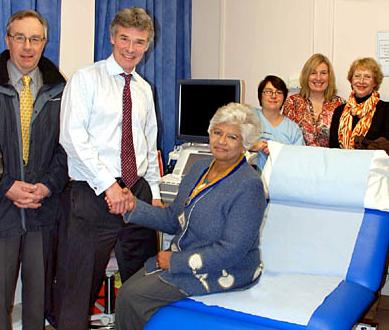Breakthrough will help the blind see again
MANCHESTER Royal Eye Hospital is to become one of the first four centres in the world to use the revolutionary Argus II electronic retinal implant device, which restores some sight to blind patients. After a successful clinical trial involving more than 30 patients around the world, and a thorough review of the product’s safety and performance by an independent body, the device is now the first approved treatment ever available for sightless people. It consists of a tiny camera and transmitter mounted in a pair of glasses, which transmits a wireless signal via a small processing device to an ultra-thin electronic receiver that is implanted in the eye and attached to the retina. The electrodes are intended to stimulate the remaining retinal nerves, allowing a signal to be passed along the optic nerve to the brain, which perceives patterns of light and dark spots corresponding to which electrodes are stimulated. Paulo E Stanga, consultant ophthalmologist and vitreoretinal surgeon at the hospital, said: “We are incredibly excited to be able to offer this life-changing procedure. It is an amazing leap forward in the field of ophthalmology.” Robert Greenberg of manufacturer, Second Sight, added: “After years of research, we are able to offer a viable long-term solution for people suffering from advanced retinal degenerative diseases such as retinitis pigmentosa.” The product was recently awarded CE Mark approval.
Scalp coolers help chemo patients
CANCER charity, Walk the Walk, has donated two Orbis Paxman scalp cooling machines to Barnet Hospital. The machines can help to prevent or reduce hair loss in some patients undergoing certain types of chemotherapy treatment. It works by lowering the temperature of the head and scalp immediately before, during, and after the chemotherapy is administered, minimising the damage to hair follicles and meaning hair loss is not always inevitable. Nina Barough, founder and chief executive of Walk the Walk, said: "I know personally how much integrated care helped me on my journey through breast cancer, so I am delighted to make this very special donation to Barnet Hospital." Jane Dean, chemotherapy team leader at the hospital, added: "It is fantastic for scalp cooling treatment to be available to patients here, enabling us to help improve their lives during this difficult time."
Boost for breast cancer treatment
NEW lymph node screening equipment has been unveiled at the Princess Royal Hospital in Farnborough. The Sysmex analyzer, which is one of only 10 in the country, enables the detection of tumours in lymph nodes in breast patient while they are undergoing surgery. Having the results during operations means any further procedures can be carried out at the same time. The analyser will be used by South London Healthcare NHS Trust, initially at the Princess Royal and then at Queen Elizabeth Hospital in Woolwich. George Jenkins, trust chairman, said: “Anything that helps eliminate an anxious wait is a great relief for patients and their families.”
Ultrasound patients sit in comfort

ULTRASOUND patients at the Royal Hampshire County Hospital in Winchester can now lie back in comfort after the League of Friends purchased a bariatric couch for the department. The furniture, manufactured by Beaver Healthcare Equipment, can be adjusted electronically to raise and lower the height and tilt and raise the head. Dr Andrew Page, clinical director of medical imaging, said: “The provision of modern ultrasound couches provides a vital component in helping to provide high-quality imaging to be undertaken on patients whether they are fit or seriously infirm.”
Robot makes young patients smile

AN INTERACTIVE robot dinosaur has found a new home on the children's ward at Warrington Hospital. Roboraptor was donated by Astech Projects, a robot automation company, after it ran a competition at an industry exhibition in Birmingham. Customers were offered the chance to take home the robot and the lucky winner, Alan Wilson, of Pirelli Tyres in Carlisle, asked for it to be donated to deserving children.
X-ray technology improves orthopaedic care
A NEW X-ray mobile image intensifier will ensure more timely delivery of care to patients at Pilgrim Hospital in Lincolnshire. The £60,000 Philips Endure device was purchased for the radiology department and uses X-rays to produce a live image feed which is displayed on a TV screen during operations. It is designed to provide high-resolution images instantaneously and can also supply a continuous live image projected onto a monitor using fluoroscopy. It will be used for imaging in orthopaedic operating theatres and connects to a Picture Archiving and Communication System. Radiology services manager, Nigel Allen, said: “This mobile technology allows us greater freedom in the organisation of radiology services. The quality of images provided will enhance the level of accuracy during the operating procedure with a reduced radiation dose.”
ALSO IN THE NEWS:
The breast imaging service at Basildon and Thurrock University Hospitals NHS Foundation Trust in Essex has been upgraded following the introduction of two new MAMMOMAT Inspiration Full Field Direct Digital mammography systems from Siemens Healthcare.
Cook Medical has announced the commercial availability of its Zilver PTX Drug Eluting Peripheral Stent in a 6 French diameter delivery system and stent lengths up to 120mm, offering new treatment options to physicians treating patients with peripheral artery disease in the superficial femoral artery.
Frimley Park Hospital NHS Foundation Trust has replaced one of its X-ray systems with a Philips Allura Xper FD20 vascular interventional system, including the latest software packages, Philips 3D-RA and XperCT.




